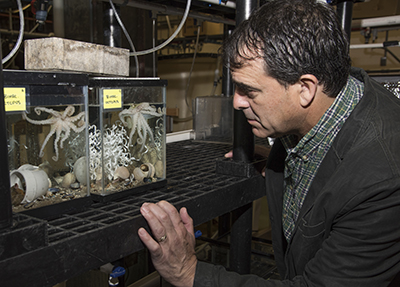Squid and Cephalopod Scientist Joshua Rosenthal Joins Marine Biological Laboratory Faculty

Joshua C. Rosenthal, a neurobiologist who studies how marine organisms adapt to the physical environment, has been appointed to the position of Senior Scientist at the Marine Biological Laboratory (MBL). Rosenthal comes to the MBL from the University of Puerto Rico, Medical Sciences Campus, where he was a Professor in the Institute of Neurobiology. His research will be carried out in the Eugene Bell Center and in the Marine Resources Center at MBL.
Rosenthal’s recruitment was supported by a generous leadership gift from Patricia and Charles Robertson, long-time supporters of the MBL. Patricia Robertson was a member of the MBL Board of Trustees from 2009 to 2016. Their gift will support research on marine organisms, furthering MBL’s commitment to the development of new model organisms to advance both fundamental biology and biomedical research.
 Joshua Rosenthal inspects two specimens of Octopus bimaculoides, the first octopus species to have its genome sequenced, in the MBL’s Marine Resources Center. Credit: Tom Kleindinst
Joshua Rosenthal inspects two specimens of Octopus bimaculoides, the first octopus species to have its genome sequenced, in the MBL’s Marine Resources Center. Credit: Tom KleindinstRosenthal’s research focuses on developing new, genetically tractable marine model organisms and understanding how they are affected by a changing environment. His expertise is in RNA editing, a natural process by which RNA transcripts from expressed genes in a cell are edited, thereby potentially altering the proteins that the cell will produce. For the last 25 years, he has studied the genetics of cephalopods (squid, cuttlefish, and octopus found in marine habitats worldwide), specifically how RNA editing regulates the excitability of their nerve cells. Currently, Rosenthal is investigating how changes in the environment affect RNA editing, both in cephalopods and in other emerging marine model systems. He is also developing methods to control and target RNA editing with the goal of functionally correcting disease mutations in human cells.
Rosenthal first came to the MBL in the 1990s with William F. Gilly, his doctoral advisor at Stanford University, to conduct research on the squid giant axon. He subsequently did postdoctoral research at the University of California, Los Angeles, with Francisco Bezanilla (now a Professor at the University of Chicago), with whom he also collaborated at the MBL. Rosenthal returned to the MBL from 2011 to 2014 as a research fellow. He was recruited to the resident scientist program in fall 2016 and was formally welcomed at a dinner with the Robertsons and invited guests in January 2017.
—###—
The Marine Biological Laboratory (MBL) is dedicated to scientific discovery – exploring fundamental biology, understanding marine biodiversity and the environment, and informing the human condition through research and education. Founded in Woods Hole, Massachusetts in 1888, the MBL is a private, nonprofit institution and an affiliate of the University of Chicago.